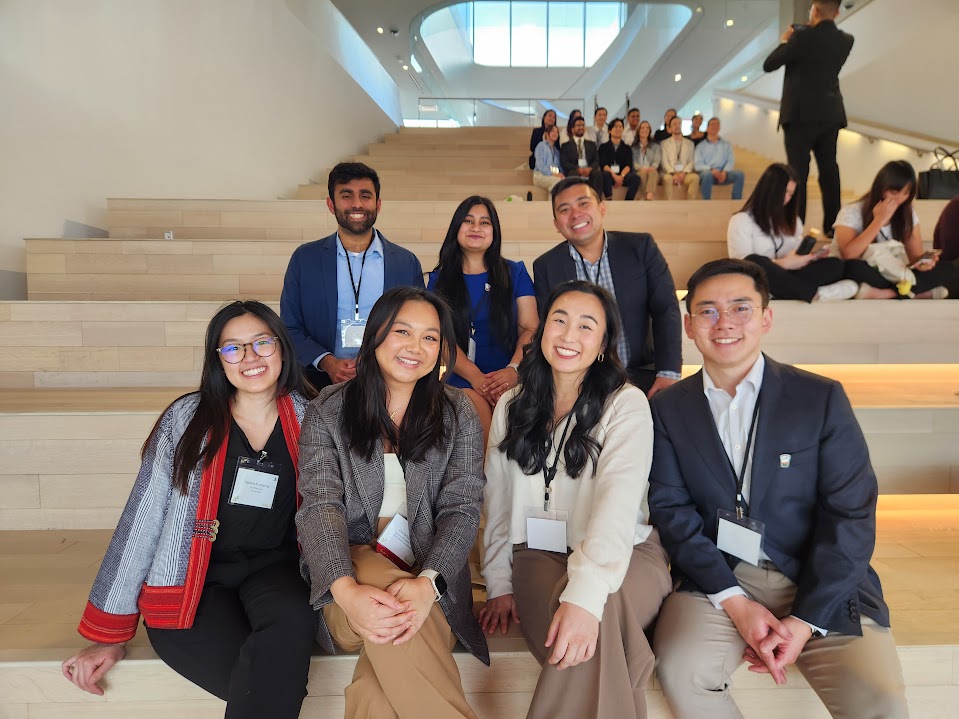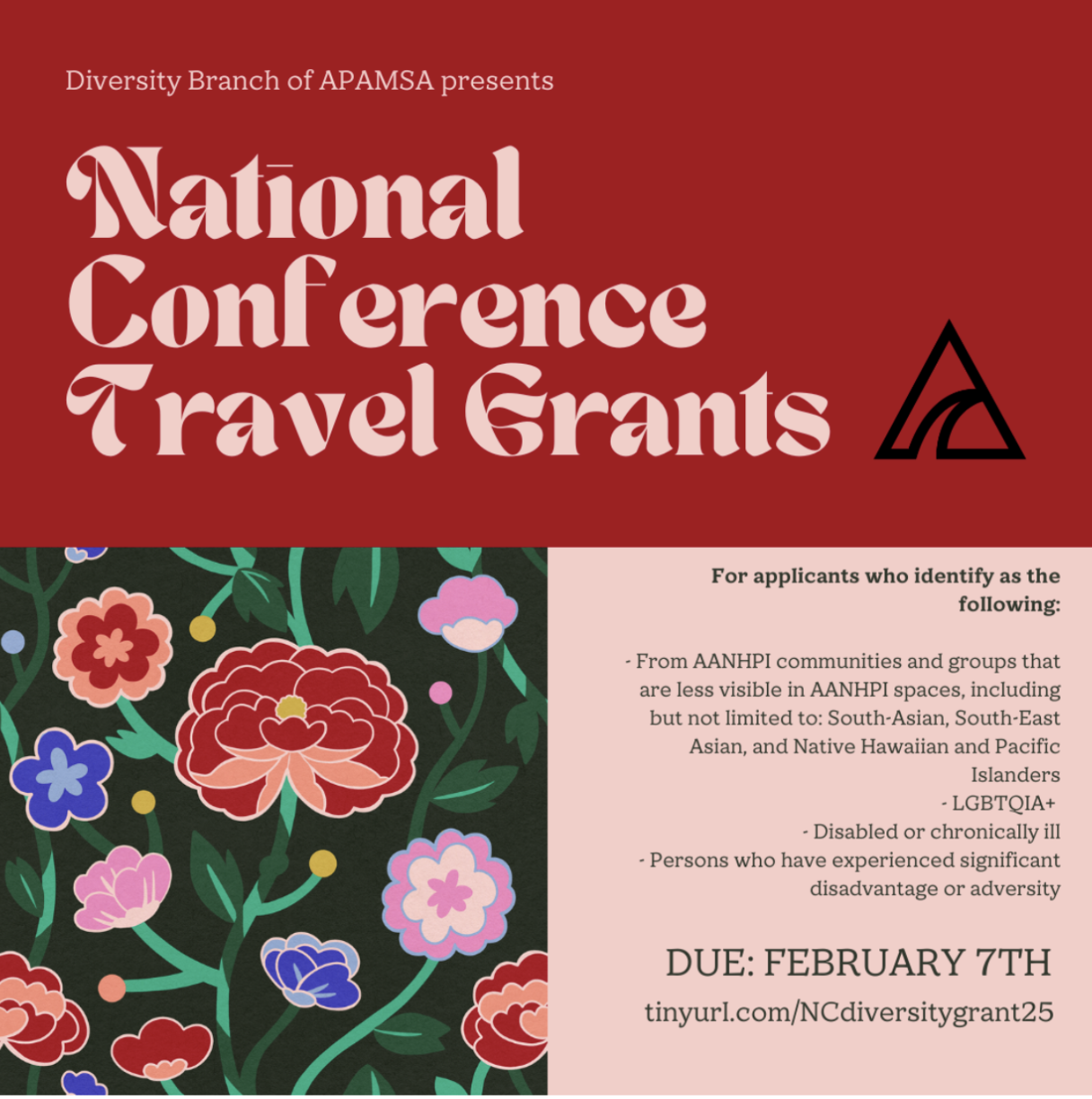
Diversity
The APAMSA Diversity Branch aims to uplift underrepresented voices in our community to better express the diversity of AANHPI experiences.
APAMSA is an inclusive organization that continually strives to better represent the diversity of AANHPI experiences. The Diversity Director focuses on uplifting underrepresented voices in our community and spotlighting intersectionality.
Questions? Contact the Diversity Branch Director at diversity@apamsa.org.

Announcements:
Join us at National Conference!Diversity Mixer scheduled for Poster Session 1:45-2:45 PM. Apply for the Diversity Travel Grant below:
Our APAMSA Diversity Series
The APAMSA Diversity branch is dedicated to the intentional cultivation of diversity, equity, and inclusion within our organization and its chapters. Our aim is to engage medical students in discourse and action that promotes respect and empathy for the various groups comprising the AANHPI community.
Native Hawaiian & Pacific Islander Representation
Aims to highlight and address the unique needs, challenges, and experiences of Native Hawaiians and Other Pacific Islanders (Native Hawaiian, Polynesian, Samoan, Tahitian, Tongan, Tokelauan, Micronesians, Guamanian, Chamorro, Mariana Islander, Saipanese, Palauan, Carolinian, Kosraean, Pohnpeian, Chuukese, Yapese, Marshallese, I-Kiribati, Melanesian, Fijian, Papua New Guinean, Solomon Islander, Ni-Vanuatu).
Southeast Asian Representation
Addresses the needs of pre-med and medical students of Southeast Asian ancestry (Thailand, Vietnam, Malaysia, Philippines, Singapore, Cambodia, Brunei, Myanmar, Indonesia, Laos, and Timor-Leste). We also curate educational talks, social media takeovers, and mentorship opportunities to amplify our voices as an underrepresented group in healthcare.
South Asian Representation
Aims to uplift the diversity of South Asian experiences, voices and issues in APAMSA. Fostering network to support South Asian, Asian and immigrant premeds and medical students in their journeys in medicine. We also curate programming that highlights South Asian health and health inequity. Buy our sticker here! https://apamsa-shop.fourthwall.com/en-usd/products/henna-apamsa-sticker-2
Women in Medicine (WiM)
Dedicated to advancing gender equity and fostering a supportive environment for women in healthcare, with a unique focus on members of the AANHPI community. Through mentorship, professional development, and advocacy, this committee empowers women at all stages of their careers.
LGBQTIA+ Committee
Aims to ensure that LGBTQ+ voices are represented at APAMSA conferences and events and organizes opportunities for our members to learn more about the intersections of AANHPI and LGBTQ+ health.
Queer Visibility Features
What concerns did/do you have about being out in medical school?

I don’t think I had a specific concern about my queer identity...
…but rather the intersection of my queerness with my Vietnamese heritage, and my first-generation immigrant background. However, I knew that through championing all those identities, I would gain a more critical lens in examining our healthcare system and how the medical hierarchy can impact students and patients.
(Pronouns: he/him)

James Baldwin is my role model, in queerness, creativity, medicine, love, life and beyond.
‘Love takes off the masks that we fear we cannot live without and know we cannot live within. I use the word ‘love’ here not merely in the personal sense but as a state of being, or a state of grace – not in the infantile American sense of being made happy but in the tough and universal sense of quest and daring and growth.
(Pronouns: they/them)

I would encourage any queer individual interested in medicine to pursue it!
It’s so important for the healthcare workforce embrace diversity and reflect the population it serves. I personally wanted to pursue medicine because I wanted to see more openly identifying queer physicians championing the way towards better care, especially for the underserved LGBTQ+ population. I explicitly voiced this in my med school applications, was met with open arms at a number of schools, and now have the opportunity to work with other like-minded, openly queer health professionals.
(Pronouns: he/him)

Medical school has honestly been one of the most stifling phases of my life.
As I’ve transitioned into my clinical years, I’ve been conditioned to be wary of what microaggressions await on each new rotation and service. I’ve obsessed over trying to find what my preceptors want and expect of me that I feel like I’ve lost integral parts of who I am. The importance of diversity in the medical field has never been so apparent to me, and if anything, these experiences have inspired me to explore academic medicine so I may mentor and act as a resource for future queer API medical students.
(Pronouns: he/him)

My advice to prospective LGBTQ students applying to medical school would be to wear their identity proudly.
That kind of visibility could help you find mentors that really get where you’re coming from.
(Pronouns: he/him)


I don’t think I had a specific concern about my queer identity, but rather the intersection of my queerness with my Vietnamese heritage, and my first-generation immigrant background. However, I knew that through championing all those identities, I would gain a more critical lens in examining our healthcare system and how the medical hierarchy can impact students and patients.
(Pronouns: he/him)

Examples of our completed projects and events:
- The Outlist – a network of LGBTQIA+ identifying individuals
- Big Sib, Lil Sib – 3 years and counting
- Diversity travel grants
- Diversity meet up at National Conference
- Diversity meet ups at Regional conferences
- Spilling the Chai, on failures and successes in medical school
- Talk with Dr. Delto, a Southeast Asian female Urologist
- Navigating professional conflict with Dr. Lanna Cheuck
- Traditional Southeast Asian Medicine and Ayurvedic Medicine Talk
- Geriatric South Asian Mental Health
- LGBTQIA+ Residents Panel
- LGBTQIA+ Clinical Training
- Resolution Writing
- Mauli Ola- Ancestral Knowledge and the Power of Healing by Dr. Marcus Kawika Iwane, MD
- American Heart Health Month with South Asian Committee
- Fertility in Medicine Event
- Journal Club
Collaborations
- HPSRX
- SOMA – Resolution writing to support
- AACOM – APAMSA x Osteopathic medicine: https://www.aacom.org/detail-pages/blog/bridging-the-east-and-west-through-osteopathic-medicine
- Advocates for Youth- Self Managed Abortion Trainings